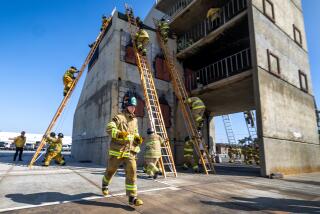THE SOUTHERN CALIFORNIA JOB MARKET: WHERE THE JOBS ARE : FINDING WORK : New Graduates Face a Hard Time This Year : There will be a few more jobs, but not many. Health care is among the few bright spots.
- Share via
NEW YORK — In this year’s recruiting season for college graduates, nurses are hot but aerospace engineers are not.
Companies hope to hire more college graduates this year than they did in 1992, but only a handful of fields are expected to benefit, college placement officers say. With many U.S. firms restructuring and eliminating jobs, there are fewer openings for job-seekers straight out of school.
Health care is one industry that is hiring, says Dawn Oberman, a statistical services specialist at the College Placement Council in Bethlehem, Pa. Jobs are also available in management information systems, for people who teach others how to use computers.
A focus on the environment has created openings for engineers, geologists, biologists and chemists. And with the attention that President Clinton has promised to pay to rebuilding the nation’s infrastructure, times should be good for civil engineers, Oberman adds.
But other industries are cutting jobs just as aggressively. Military cutbacks and hardships in the commercial airline industry have virtually shut down the market for new aerospace engineers. Would-be nuclear engineers may need to find another specialty. Jobs in finance and banking, except for technical and back-office jobs, are still hard to come by.
“There’s a fundamental shift, and most of it has come from a decrease (in campus recruiting) among the Fortune 500 companies,” says Richard Stewart, director of placement at Purdue University in Indiana.
A survey of 316 companies last fall by the College Placement Council found 54% of employers planned to hire more graduates in 1993 than they did last year.
Respondents predicted that they would hire 7.7% more graduates in the 1992-1993 school year than a year earlier. Actual hires were projected to rise to 70 per company from 65.
“However, talking to placement officers this past January and December, we haven’t seen that yet,” Oberman says.
Not only do many recruiters have fewer jobs to hand out, but they are cutting back on recruiting costs. “Back in the heyday of the 1980s, companies would send 30 or 40 recruiters to campus,” says Vicki B. Lynn, director of the Career Development Center at Rensselaer Polytechnic Institute, in Upstate New York. “Half of the people would be standing around with nothing to do.” Now, companies either don’t come at all, or send just a few recruiters.
And companies surveyed by College Placement said they plan to visit 11.3% fewer campuses this year than last.
The number of job offers continues to fall as well. At Rensselaer, 47% of the companies that recruited on campus last year made a job offer, down from about 63% in 1991, Lynn said.
Worsening matters, colleges are turning out more graduates to compete for fewer jobs. Dan Hacker, a labor economist at the U.S. Labor Department, says that from now until the year 2005, the number of college graduates will outpace the number of available jobs by 20% each year.
The number of college graduates continues to rise despite a slight dip in the population of 22-year-olds, Hacker says.
There are some bright spots. While big companies are cutting back, jobs are opening up in smaller companies. But these are hard to come by, and they tend to be at companies that cannot afford to send recruiters to campus. So college students and recruitment officers have to be more aggressive at seeking these companies out, placement officials said.
Colleges must also be more inventive to get their students placed. Cooperative programs, in which a company can test out a potential employee for a semester free of charge, are gaining in popularity.
Rensselaer has instituted a “Jobathon,” modeled after telephone fund-raising drives, in which students spend three evenings calling alumni to ask not for money but for jobs.
More schools are computerizing students’ resumes, so that when they get a call for, say, a chemical engineer or a nurse, the placement office can quickly come up with several candidates.
Now more than ever, students have to do well at whatever they study, Stewart says.
They have to have good grades, good communication and leadership skills, and know how to work cooperatively.
More to Read
Inside the business of entertainment
The Wide Shot brings you news, analysis and insights on everything from streaming wars to production — and what it all means for the future.
You may occasionally receive promotional content from the Los Angeles Times.








